“This is Burma, and it is quite unlike any land you know about.“
Rudyard Kipling, 1898
After having survived a week of extreme intensity, full of work, stress, an emotional lowlight, fun, a lot of beer (yes, Oktoberfest has reached even this remote corner of the globe), finally I’ve found time for some writing.
I have so much to write about, it’s hard to organize this amount of thoughts and memories inside my head. But writing is becoming my method to elaborate all that happens to me here, to go through it all once again and try to capture the essence and hold onto it by turning it into words. Well, I often fail doing this, finding the right words is difficult and I get frustrated. What helps me sometimes is changing language! I slip into Italian, mixing it with some German, and each time I am amazed by the different possibilities that exist for expressing the same thought. Languages are beautiful, Za-ga hlà-dé (that’s Burmese).
Today I wanna talk about my weekend trip to Mandalay and Monywa, because it was definitely my highlight of this first month of Myanmar. And also because it’s more than a week ago, and I want to write about other things as well, as far as this blog is concerned I am so not on top of my shit…
Anyway, here we go.
My dear readers, once upon a time, on Friday, October 2nd, the great and renowned German Ambassador to Myanmar decided to throw a big party, purchasing the purpose of celebrating 25 years of united Germany, or maybe to anticipate the Tag der Deutschen Einheit (3. Oktober), or maybe just to advertise the Oktoberfest Yangon 2015, which took place one week later and was indeed a roaming success. Even the new, young and unexperienced volunteer from the Goethe Institut had been invited, to his great happiness. In fact I received not one, but two formal invitations via post, plus another invitation via email, seems like they really wanted me to come hehehe. I had „planned“ a weekend trip with my two Myanmar friends, Joshua and Win Htet, to their native cities in the north of Myanmar, but since I didn’t want to disappoint the mentioned great and renowned Ambassador, I combined the two things. I went to the Ambassador’s party, half an hour late (as usual), but wearing my best shoes and my best shirt; I had even found an elegant tie in the depths of my backpack, and after 25 minutes of vane trying in front of the mirror I had managed, all on my own, to make the knot of the tie around my neck (is that ow you say it? I’m not a tie-expert).
The „party“ wasn’t exactly my cup of tea, as the English would say: a bunch of VIPs discussing high-level political issues, no music, and most of the people had left already at 8pm. But I got to shake the hand of the great and renowned Ambassador (!!!) and the food was excellent, which kept me busy for the whole time (I hadn’t had lunch that day).
At 8:30 Joshua and Win Htet picked me up with Joshua’s friend, a very nice taxi driver who always smiles and chews on his betel nut. He drove us to the bus station, not losing his temper when I changed from my fancy clothes into normal clothes in the back of his car. The bus station of Yangon is quite similar to a giant ant-nest, so many people and so many busses and taxis and scooters and cars! Before getting on our bus, I witnessed a car crash, fortunately without serious injuries, and I tried for the first time a betel nut: it’s a thing that all the drivers here constantly eat, it’s wrapped up in a leaf and makes you spit red stuff, it’s supposed to be some sort of light drug and make you high but I didn’t really feel anything. Cool experience though, I made friends with the betel-nut-selling-girl.
The bus was going to take us to Mandalay over night, a 10 hours drive through the dark Myanmar countryside. I slept the whole drive long, dreaming weird stuff, not sure if because of the constant shaking or because of the betel nut…
Mandalay is a city in the middle of Myanmar. It’s a royal city, it used to be the capital of several glorious kingdoms before the British exiled the last king in 1885 and colonized everything. Joshua’s family lives in Mandalay, his uncle came to pick us up at the bus station at 7am and drove us home, where we had breakfast. I don’t really get it yet, in Myanmar you basically eat the same things for breakfast, lunch and dinner, usually rice with chicken/pork and vegetables, but I was hungry so it was good. Joshua’s family is just awesome, the were super nice to me and thought me some basics in Burmese, always showing that bright and warm smile that is so characteristic of this land. Myanmar – Land of smiles! The lovely family was so excited about me having my first real conversation in Burmese that they decided to give me a Burmese name: now I am officially „Maung Shwe“, Mister Gold. Such a beautiful name, isn’t it? “Maung” is the young version of “U”, which means Mister, because I am still under 25 and cannot be called „U“. And „Shwe“ is actually the first Burmese word I learned, just like every foreigner who comes to Myanmar: “Shwe” means gold, and you can find it everywhere here. Every other street is called Shwe-something, every restaurant, every hotel, every travel agency, and of course every pagoda (the Shwedagon Pagoda for instance). It’s not a surprise that Myanmar is often called „the golden Land“.
So since then I developed my standard approach to people. I go up to them and tell them, slowly and clearly: „Mingalabà, ca-nàw na-meh Maung Shwe bà. Ca-nàw pyaw-dé“. Hello, my name is Mister Gold. I am happy.
Throughout the day we cruised across Mandalay, from one pagoda to the other. So much gold in one day! Someone likes it hot, and the Buddhists like it gold. We visited the Royal Palace, set in the middle of the city, surrounded by a vaste area of tropic vegetation and by a system of channels, so that the palace is actually on an island. The most impressive thing was probably the complex of many dozens of cute little red houses behind the palace, meant for the king’s wives and concubines. These Burmese kings used to have big number of wives and lovers, sneaking from room to room during the night and often giving life to over 100 children!
There is a term, a neologism, becoming more and more popular among the groups of foreigners and tourists that end up to visit Myanmar for some reason: „Overpagoded. I am so overpagoded“. It properly describes the feeling caused by the overdoses of pagodas, of shining „stupas“, of gold, of Buddha statues. It’s a mixture of being overwhelmed, deeply impressed, and also tired because of several hours of walking. It made me think of when I was 9 years old and my awesome grandmother took me and my cousin Andrea to the Vatican Museums in Rome, dragging us through a non-stop-5-hours-tour and pouring over us all her immense knowledge, leaving us with that feeling of being small, impressed by those great artists, and super tired. Yet, the overdoses of museums that you can get in the Louvre in Paris or in the Uffizi in Florence is very different form the overdoses of pagodas in Myanmar, because of the tropical vegetation everywhere around and because of that sense of Buddhism, of calmness, of peace and harmony with the world that is floating in the air.
After having reached the peak of „overpagodedness“ we drove to the U Pain bridge, a picturesque long wooden bridge that connects Mandalay and an island in the middle of the lake Thaung Tha Man. We crossed the bridge, walking for about 30 minutes under the boiling sun, and walked back under an even hotter sun, melting away with every step. I learned how too say „it’s too hot“ (a-yan pù-deh!) and „I want water“ (ye chaiq-teh).
We visited a last pagoda, the biggest in Mandalay, and then the time had come already to catch our bus in direction Monywa. I said goodbye to Joshua’s happy family and they made me promise that I would come back to Mandalay. I will, certainly!
This bus was smaller, colder (Myanmar people like it cold, there is air condition everywhere) and uncomfortable, but it was only a 4-hours ride. Let’s call it a real Myanmar ride, which basically means that we rushed with 80-100 km/h across Myanmar country roads in a bad condition, hopping over every hole. The Myanmar driving technique simply consists in pushing the gas pedal until the engine starts making strange noises, and most importantly in horning every obstacle out of the way. Slowing down is not really an option, first you must try to press the horn loudly enough to scare away the man, woman, bicycle, scooter, dog or cow that is standing on your path. Our driver was particullary talented in this way of driving, and somehow it seemed to work, but just when I was starting to fall asleep, despite the constant hopping up and down and the fact that my legs were far too long for that car seat, I heard a loud „boom“. We had hit a wild dog that was crossing the road, and most likely killed it. The driver stopped for a moment, grumbled some words in Burmese and started again, rushing over the dark fields and forests.
We got to Monywa in the late evening. We were welcomed by Win Htet’s dormitory, or „boarder“, as it’s called here. Basically it’s a simple and humble house where 7-8 students live during the period of the year in which they attend university classes. Also 3 older women live in the boarder; Win Htet calls them „aunties“, but here in Myanmar everybody is everybody’s brother and sister and auntie, so I doubt that they are actually relatives. I didn’t really understand who these women were and what they did there, but they were nice, so it was fine.
The boys, Win Htet’s friends, were great as well. I don’t remember all of their names, but we had a very good time together. Most of them are students of the University of Monywa and study English as their major subject, yet they were not able to have a conversation in basic English with me. I peaked into an English exercise book of theirs, and the exercises were similar to those you would get in 7th grade in Germany. But despite the language barriers we instantly liked each other, and they kept giving me those gentle and honest smiles that are so common here. Myanmar – Land of smiles! We had a late dinner in a local tea house, I payed for the dinner (something like 10€ for 8 people!). We went back to the dorm, and before going to sleep one of the boys took out his guitar and started playing. Joshua took over after a while, showing off some guitar skills I would have never expected. This guy is so talented in everything he does, from playing piano and guitar to crafty things to IT and technical stuff. It was a magic moment, listening to these boys singing burmese songs; it proved to me once more how powerful music can be in bringing together people, without needing to share a language. When Joshua went on playing the cords to „Let it be“ and „Yesterday“, I sang along and seriously felt like if I were in a surreal LPC Rest Day Evening Program. Magic.
I got to spend a real Myanmar night: we all slept on the wooden floor, because mattresses don’t seem to be a thing in real Myanmar. We were woken up not later than 6:30am by the light and the noises of a new real Myanmar day. I took a real Myanmar shower, which means I poured water out of a well over my head using a plastic bowl and wearing a swim suit, since the well is right next to the road. I also had the great pleasure to use a real Myanmar toilet, but I am not going to go into further details about this 🙂
We went to a local tea house to drink a real Myanmar coffee (not exactly like an Italian cappuccino) and to have a real Myanmar breakfast, delicious and so cheap! I was the main attraction in that tea house, since Monywa is not a touristic place and the people are not used to see a tall white blond guy with a crew of local boys. Being the main attraction here basically means that everybody is smiling at you. I had the chance to show off my Burmese skills, which at that point were limited to „hello, how are you“ and the numbers from 1 to 10. I noticed that every single one of the many waiters in the tea house was younger than 12 year old, and Win Htet and his friends told me that they had all been waiters in some local restaurant at that age, because that little money can always be useful for their families. They were quite shocked when I started telling them about laws in Europe that prohibit children to work, and about the concept of a legal minimal wage. But don’t go straight to picturing me surrounded by a bunch of starving kids that work hard for 14 hours a day: the kids were the most smiley out of a very smiley population, and the people of this town in general made a happy and careless impression, genuinely enjoying what they have.
Ups, I forgot to write about the coolest thing about my time in Monywa: the motorbikes. Some of Win Htet’s friends had motorbikes, I’m telling you, very nice motorbikes! I could see how proud they were about those motorbikes, there was no need for them to explain it to me in English. The motorbikes became our transport vehicles, and that was good because Monywa is so spread out that it’s impossible to move from one place by foot. We were the kings of the street riding those motorbikes, we ruled the road, yo! In a combination of 6 people on 3 bikes we cruised through Monywa, from pagoda to pagoda, waving at grandmas, playful children and cows along the way, and of course wearing no helmet. I learned how to say „mya mya mao“ (drive faster!).
We visited some golden pagodas (you never get enough of those), including one, famous all over Myanmar, that contains a total of …….… statues of Buddha, small ones and big ones, from the size of my thumb to the size of an elephant. A little later, a funny episode happened: we were driving on a road, something you could call a Myanmar „highway“, surrounded by rice fields and muddy lakes, when we saw a huge line of motorbikes on the side of the road. Everyone was stopping there, hectically consulting each other, moving their hands and talking Burmese very fast. I had no clue of what was happening, and no one bothered to tell me. Some people started to make a U-turn and to head back in the opposite direction, and we did the same. Only after that my driver Aung tried to explain, using hand gestures (while he was driving the motorbike…), that there was a police block on the road, and that they would have stopped everyone who was not wearing a helmet and give them a fine.
Just before lunch I had a moment of struggle, but I want to tell you about this as well. It wasn’t anything serious, but it made me think a lot. Basically it started to rain, and when it rains in Myanmar, it really rains. Big fat raindrops fall from the dense clouds, hammering on your head and back like little stones being thrown at you. And you get completely soaked within 15 seconds, so we stopped in a local tea house for shelter and had a tea. Win Htet disappeared for a while and came back with a raincoat, for me. Because I „am not used to Myanmar rain“. This caught me on a bad side, and I had a strongly repulsive reaction: I started telling him that I was not different from them, that if they could drive a motorbike under the rain, I could do the same. He was looking at me, smiling, and kept trying to give me that raincoat, but I was pushing it back, complaining that he should have asked me before buying the raincoat, and that rain is just water, nothing more, we have rain in Europe as well! As his smile became a little more insecure, I went on telling him that this was wrong, that it was racist to think that I would not survive some heavy rain only because I am European, and that I felt discriminated against. I think (and hope) that he didn’t understand everything I said, but I caught myself and stopped my frustrated monologue. I ended up wearing the raincoat for a while and then giving it to Aung, who was cold. Win Htet only wanted to demonstrate the Burmese hospitality and be nice to me, and I later explained that what I had been trying to transmit was simply that I am not different from them. I overreacted, sure, but this topic is very important to me: I want to distance myself as much possible from the colonization period, I don’t want to be seen as the big rich powerful white European, coming to Myanmar and observing everything in a bubble, from behind a glass wall, like some sort of museum exhibition.
We had lunch in a sort of “All you can eat“ thing, paying 2000K (1,50€!). In the afternoon, riding our super speedy bikes, we checked out the most famous place in Monywa: the standing Buddha. Or actually it’s the standing Buddha, next to the laying-down Buddha. And next to the standing Buddha and the laying-down Buddha they are currently building the sitting Buddha. I wonder what will be next, maybe the standing-on-his-hands-Buddha…
Anyway, the standing Buddha of Monywa is the second tallest Buddha in the world, and he is indeed impressive.
Towards the late afternoon the sun came out again, and our drive from the last pagoda back to the boarder was just epic. The warm afternoon light made the wet, green jungle around us shine vividly, and I opened my arms and closed my eyes, feeling the real Myanmar wind in my hair and deeply breathing the real Myanmar air.

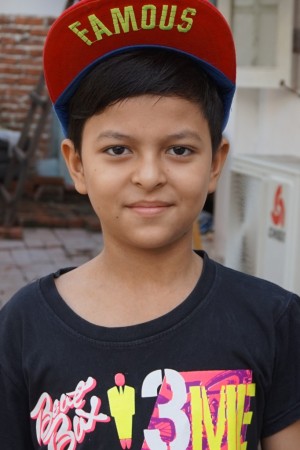
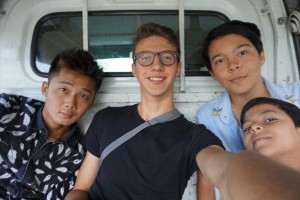
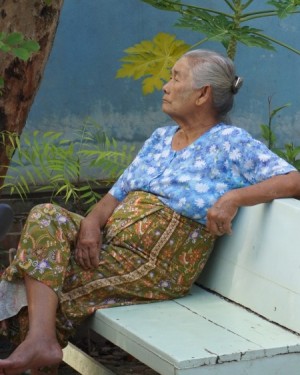
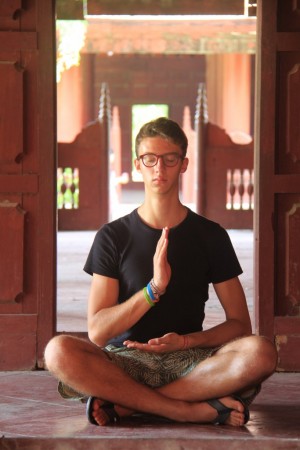
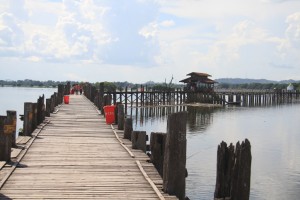
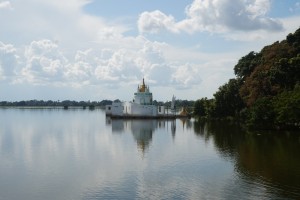
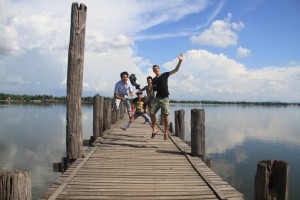
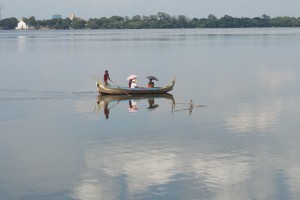
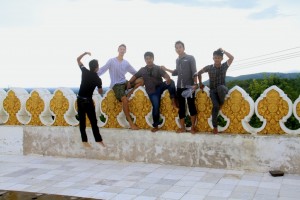
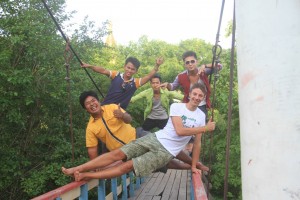
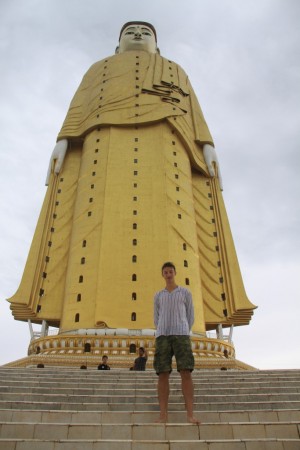
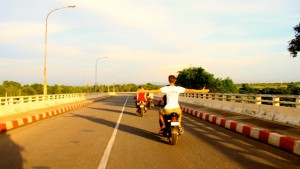
forse non hai letto molto sul buddhismo prima di partire per il Myanmar, ma mi sembra che hai incominciato a respirarne l’aria con molti benefici: la facilità di legare con le persone che da sempre vivono lì, il percorrere il paese entrandoci dentro e accettandolo per quello che è con il caldo, le piogge e tutte le caratteristiche del “real” Myanmar, vuol dire essersi fatti prendere dalla serena tranquillità di quel modo di pensare, lasciandosi per un po’ alle spalle le nostre scale di valori competitivi. Evviva! E come devono sembrarti lontani i Musei Vaticani e Michelangiolo con tutta la sua drammaticità… Però vedo che nel ricordo hai assimilato il succedersi infinito di quelle stanze alla sfilata senza limiti di pagode, e questo tuo richiamo mi ha molto rallegrato.
Nice stuff brother. Glad you’re having a good time in the city of Pagodas!